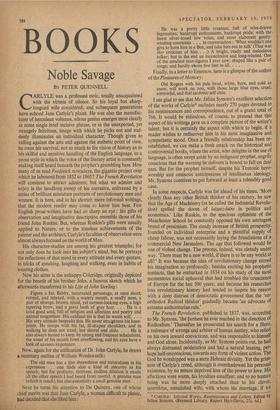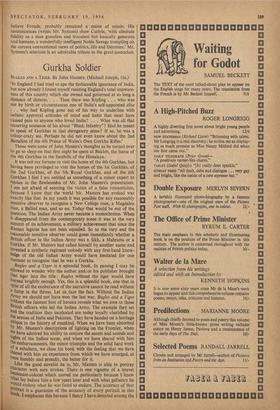BOOKS
Noble Savage
BY PETER QUENNELL CARLYLE was a professed stoic, totally unacquainted with the virtues of silence. So his loyal but sharp- tongued wife considered; and subsequent generations have echoed Jane Carlyle's plaint. He was also the manufac- turer of herculean volumes, whose genius emerges most clearly in some single brief incisive phrase, or in the unexpected, yet strangely felicitous, image with which he picks out and sud- denly illuminates an individual character. Though given to railing against the arts and against the wsthetic point of view, he owes his survival, not so much to his vision of history as to his skilful and sensitive handling of the English language, to a prose style in which the voice of the literary artist is constantly making itself heard beneath the prophet's grumbling bass. How many of us read Frederick nowadays, the gigantic project over which he laboured from 1852 to 1865? The French Revolution will continue to attract admirers; but what we admire and enjoy is the headlong sweep of his narrative, enlivened by a series of brilliant miniature portraits of revolutionary men and women. It is here, and in his shorter, more informal writings, that the modern reader may come to know him best. Few English prose-writers have had so sharp an eye : his gifts of observation and imaginative description resemble those of his friend John Ruskin. But, whereas Ruskin's gifts were usually applied to Nature, or to the timeless achievements of the painter and the architect, Carlyle's faculties of observation were almost always focused on the world of Man.
His character-studies are among his greatest triumphs; for not only does he look into his subject's mind, but he portrays the reflections of that mind in every attitude and every gesture, in tricks of speaking, laughing and walking, even in habits of wearing clothes.
Now his sitter is the unhappy Coleridge, originally depicted for the benefit of his brother John. a famous sketch which he afterwards transferred to his Life of John Sterling: Figure a fat, flabby, incurvated personage, at once short, rotund, and relaxed, with a watery mouth, a snuffy nose, a pair of strange, brown, timid, yet earnest-looking eyes, a high tapering brow, and a great bush of grey hair, . . . He is a kind good soul, full of religion and affection and poetry and animal magnetism. His cardinal sin is that he wants will. . . . His very attitude bespeaks this. He never straightens his knee- joints. He stoops with his fat, ill-shapen shoulders, and in walking he does not tread, but shovel and slide. . . . He is also always busied to keep, by strong and frequent inhalationS, the water of his mouth from overflowing, and his eyes have a look of anxious impotence.
Now, again for the edification of Dr. John Carlyle, he draws I summary outline of William Wordsworth : The old man has a fine shrewdness and naturalness in his expression . . . one finds also a kind of sincerity in his speech; but for prolixity, thinness, endless dilution it excels all the other speech 1 had heard from mortal. A genuine man (which is much), but also essentially a small genuine man.. . Next he turns his attention to De Quincey, one of whose chief merits was that Jane Carlyle, a woman difficult to please, had decided that she liked him :
He was a pretty little creature, full of wire-drawn ingenuities; bankrupt enthusiasms, bankrupt pride; with the finest silver-toned low voice, and most elaborate gently- winding courtesies . . . in conversation : 'What wouldn't one give to have him in a Box, and take him out to talk' (That was Her criticism of him . . .) A bright, ready and melodious talker; but in the end an inconclusive and long-winded. One of the smallest man-figures 1 ever saw; shaped like a pair of tongs; and hardly above five feet in all. . . .
Finally, in a letter to Emerson, here is a glimpse of the author of the Pleasures of Memory: Old Rogers with his pale head, white, bare, and cold as snow, will work on you, with those large blue eyes, cruel, sorrowful, and that sardonic self-chin.
I am glad to see that Mr. Julian Symons's excellent selection of the works of Carlyle* includes nearly 270 pages devoted to his reminiscences and correspondence, out of a grand total of 766. It would be ridiculous, of course, to pretend that this aspect of his writings gave us a complete picture of the writer's talent; but it is certainly the aspect with which to begin, if a reader wishes to rediscover him in his most imaginative and sympathetic mood. Once a friendly relationship has been re- established, we can make a fresh attack on the historical and controversial books, where the artist, who delights in the use of language, is often swept aside by an indignant prophet, angrily conscious that the warning he delivers is bound to fall on deaf ears. But for the prophet himself, despite his Teutonic hero- worship and ominous anticipations of totalitarian ideology. Mr. Symons contrives to put forward at least a tolerably good case.
In some respects, Carlyle was far ahead of his times. 'More clearly than any other British thinker of his century, he saw that the Age of Machinery (as he called the Industrial Revolu- tion) spelled the doom of laissez-faire in politics and economics.' Like Ruskin, to the specious optimism of the Manchester School he constantly opposed his own astringent brand of pessimism. The steady increase of British ,prosperity, founded on individual enterprise and a plentiful supply of cheap labour, was not necessarily laying the foundations of a commercial New Jerusalem. The age that followed would be one of violent change. The process, indeed, was already under way. 'There must be a new world, if there is to be any world at all!' It was because the idea of revolutionary change stirred his imagination so profoundly, besides exciting his prophetic instincts, that he embarked in 1834 on his study of the most momentous social upheaval that had troubled the conscience of Europe for the last 500 years; and because his researches into revolutionary history had tended to inspire his reason with a deep distrust of democratic government that the `un- orthodox Radical thinker' gradually became 'an advocate of extreme authoritarian rule.'
The French Revolution, published in 1837, was, according to Mr. Symons. 'the farthest he ever reached in the direction of Radicalism.' Thereafter he prosecuted his search for a Hero, a redressor of wrongs and arbiter of human destiny, who relied on his own inward convictions, and was responsible to himself and God alone. Incidentally, as Mr. Symons points out, he had always distrusted moderation and had a natural leaning, per- haps half-unconscious, towards any form of violent action. The God he worshipped was a stern Hebraic divinity. Yet the grim- ness of Carlyle's creed, although it overshadowed his personal existence, by no means deprived him of the power to love. His affections were warm, his loyalties steadfast; and to no human being was he more deeply attached than to his clever, querulous, unsatisfied wife, with whom his marriage, if No • CARLYLE : Selected Works, Reminiscences and Letters. Edited by Julian Symons. (Reynard Library. Rupert Hart-Davis, 27s, 6d.)
believe Froude, probably remained a union of minds. His reminiscences (writes Mr. Symons) show Carlyle, 'with absolute fidelity as a man graceless and truculent but basically generous and humane, a wonderfully intelligent Noble Savage trampling on the current conventional views of politics, life and literature.' Mr. Symons's selection is an admirable tribute to the great iconoclast.



































 Previous page
Previous page